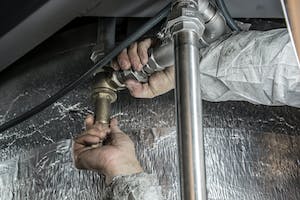What Does a Plumber Do?
by siteadmin

Plumbers are responsible for installing, maintaining and repairing pipes, valves and fixtures in homes and businesses. They may also work on industrial equipment like power plants, factories or HVAC systems.
Plumbers must be able to comprehend plumbing issues and communicate them clearly with clients. Furthermore, they may need to know how to read blueprints and building specifications in order to guarantee the job is done correctly.
Installation
Plumbers install pipes for water and gas distribution and waste disposal in homes, businesses, and industrial buildings. They might also be responsible for installing fixtures in bathrooms or kitchens.
Construction laborers, plumbing contractors and maintenance departments are often employed. Some work as self-employed individuals or as sole proprietors.
It's a big responsibility, but it can also be rewarding when your project is finished on schedule and within budget. When selecting a plumber, make sure they are licensed and insured.
They can be trained on-the-job or through an apprenticeship program that combines classroom instruction and paid on-the-job experience. The ideal candidates have knowledge of local codes and regulations, along with physical strength to work long hours and the confidence to deal with various clients. Most importantly, they possess a good grasp of modern technologies so they can identify potential issues before they become major ones.
Maintenance
When a plumber is hired, they have several tasks to accomplish. Primarily, they install and repair pipes that transport water, gas or other fluids between homes, businesses and factories; additionally, plumbers maintain plumbing fixtures and appliances such as dishwashers, washing machines and heating systems.
They may also be called upon to assess and repair plumbing emergencies related to a home's water system, such as leaks, clogged drains or toilet issues. Their skill in solving these situations should minimize property damage as well as potential health risks associated with them.
Plumbers are heavily regulated, with most states requiring them to be licensed and insured. Furthermore, they must possess experience and receive ongoing training to stay abreast of industry advancements.
Repair
Hiring a plumber is the ideal solution when you have plumbing emergencies at home. He comes to your house to repair or replace pipes and equipment in your house, as well as help solve issues like leaky or clogged drains and faucets.
They not only address the immediate problem, but they will also suggest ways to prevent it from occurring again. This saves you both time and money in the long run.
Professional plumbers always possess the latest tools and equipment to guarantee they do an excellent job the first time. Furthermore, they possess the knowledge to explain what they are doing so you can ask questions with confidence and gain insight into why things are done a certain way.
They also stay abreast of the most up-to-date plumbing codes and standards, making them invaluable assets when it comes to home inspections or potential sales of your property.
Troubleshooting
Troubleshooting is the process of diagnosing and correcting issues related to equipment or systems that malfunction. It utilizes various techniques to identify the source of the issue and fully restore a piece of equipment or application back to its operational state.
The initial step in troubleshooting any issue is gathering information about it. This includes symptoms, how it was caused, and any special circumstances that must exist for resolution to take place.
Next, a technician or support specialist might check hardware connectivity and any related symptoms. They could also research on a knowledge base or consult product documentation for assistance.
The most widely-used troubleshooting technique is the split-half approach, in which a technician tests half of the system at a time to identify where the issue lies. Once that test works, they move on to testing the remaining half. This usually takes less time and provides increased assurance that the issue has been identified and rectified.
Plumbers are responsible for installing, maintaining and repairing pipes, valves and fixtures in homes and businesses. They may also work on industrial equipment like power plants, factories or HVAC systems. Plumbers must be able to comprehend plumbing issues and communicate them clearly with clients. Furthermore, they may need to know how to read blueprints and…
Recent Posts
- Leading the Way in Air Conditioning Services in Provo, UT
- The Amp Solar Company: Illuminating Salt Lake City with Sustainable Energy Solutions
- Nathan Premier Basement Finishing: Elevating Home Spaces in Lehi
- Sacramento Roof Company: Elevating Standards in Roofing Excellence in Sacramento
- Utah Injury Pros: Leading Advocates for Motorcycle Accident Victims in Salt Lake City and Provo
